

Written by A M Nasir Uddin and Sheng Cabusao
The influx of Rohingya refugees into Bangladesh since 25 August is now over 370,000 with the figures increasing daily. They are being supported by the Government of Bangladesh, local and international non-governmental organisations and host communities.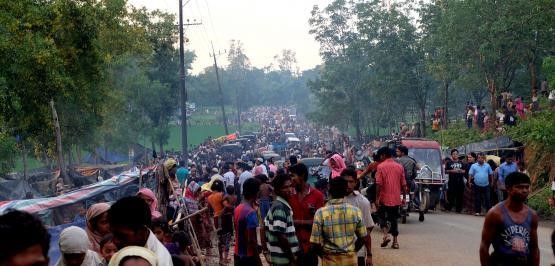
Since the last 1970s, Bangladesh has hosted Rohingya refugees in Cox’s Bazar district of Chittagong Division located in the southeast region of the country. In 1978, Bangladesh hosted over 222,000 Rohingya who soon after were repatriated. The next major influx was in 1991-1992 when 250,000 entered the country but aside from 32,000 who continued to reside in registered camps, most were repatriated. 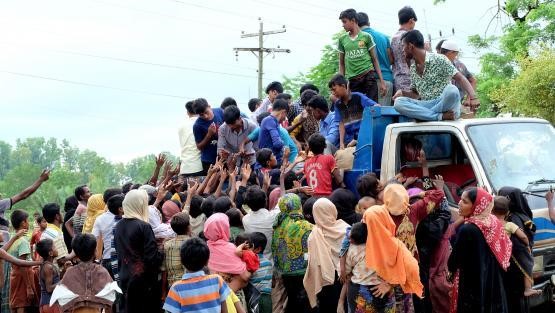
During our visit to Cox’s Bazar district, we visited camps located in Ukhiya Upazila where Kutupalong and Balukhali camps are located. The situation in these camps are extremely dire. While the Kutupalong Registered camp has expanded to accommodate new arrivals, we saw the increase of refugees both in makeshift camps and spontaneous settlements.
Thousands of Rohingya undertaken the dangerous travel to cross over to Bangladesh daily. Over 185,000 refugees have settled in spontaneous settlements by the roads and have little by way of tarpaulins, rope and/or bamboo to construct a temporary shelter. Given the limited space for construction, many have taken refuge on the sides of hills which pose risk of increase landslides due to the monsoon rains. Many we saw arrived in Bangladesh feeling traumatized, hungry, tired and sick.
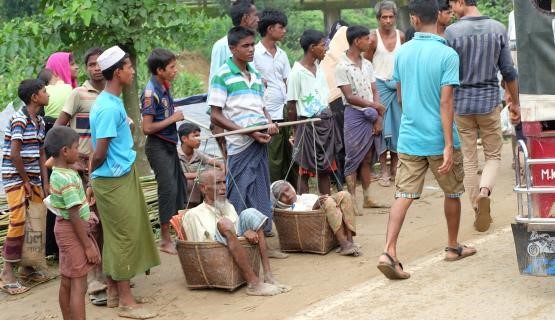
We noticed that many of the refugees are women, children and the elderly. While there are spaces for women and children which supported the Rohingya population from before the mass exodus, there is a need to rapidly scale up interventions across all sectors.
We spoke with few of the refugees during our visit to the Balukhali makeshift camp. Amena, 20 years old, who recently arrived in Bangladesh has two children of whom one is only a month old.
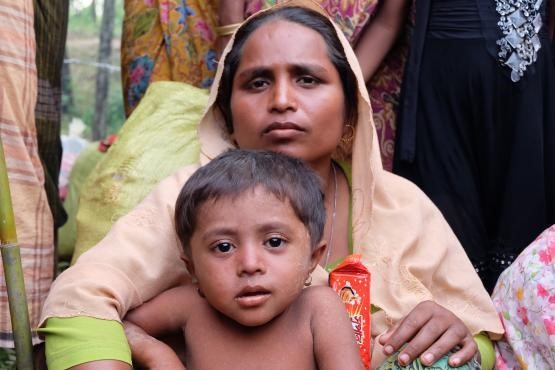
“Our houses were burnt by Myanmar Army. We were forced to leave our home or otherwise they will not spare us from killing. I have crossed the border with my family, sister and niece – walked over the two mountains for one week just to reach here. We asked food from whoever we met on the way. My sister, Ambia, helped me carry my husband because of his disability and I have a month old baby with me.” Amena narrated.
Ambia, too has her own heartbreak and struggles as she lost touch with her husband and son while fleeing. “I lost my husband and son while we were running away, they have mixed to other refugees and I now I don’t have any idea of their whereabouts or if they are still alive.” Ambia shared.
Noor Kayda is only 17 years old and a mother of a 6 month old child. She arrived in Ukhiya four days earlier than Amena and Ambia.
“All of us in my village was really surprised when the military and some Buddhists in Rakhine arrived in our place and started burning our houses. My husband who did not want to leave our house was killed and his body left inside the burning house. We were forced to run or also face death. We couldn’t take anything except the clothes that we are wearing” she noted.
We left knowing that for many who have recently arrived in Bangladesh, their lives were in limbo. Coming to terms with their experiences and rebuilding their lives will be a long-term process. While they are trying to adjust to their lives in the makeshift camps, many remain traumatised by their experiences and loss of loved ones.
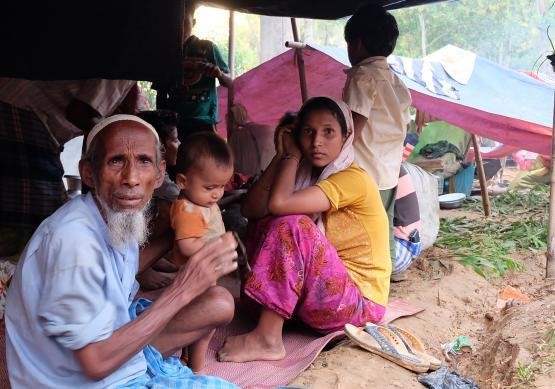
Food, water and sanitation and shelter are the urgent needs of the population. Given the huge exodus of the Rohingya population, the systems on the ground are overwhelmed with all stakeholders -government, NGOs and communities – doing their best to provide food, water, shelter and basic health services. ActionAid will undertake interventions in the sectors of food assistance, WASH, Shelter and GBV. In order to address the situation, we urgently require your support to scale up initiatives.